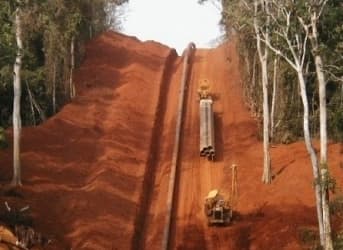Sometimes it’s the obscure items about news reports that catch one’s eye.
On 17 March a senior official of the Cameroon’s state-run National Hydrocarbons Corporation (SNH) told China’s Xinhua news agency the private Anglo-French oil and gas company Perenco subsidiary Perenco Cameroon will raise its Cameroon oil production to 50,000 barrels per day by March 2012. The increase is because of soaring production from its Baf-3 oilfield offshore in the Kribi/ Campo basin on the country’s southern Atlantic coast.
The official, speaking on condition of anonymity told Xinhua, "This great progress at Baf 3 is a clear indication that we are very likely going to meet our target of increasing total national production to at least 100,000 bpd in 2012. This optimism is further guided by the fact that Perenco has not yet started operations at the much-awaited Dissoni oilfields in the Rio Del Rey basin close to the Nigerian border in the Gulf of Guinea."
Perenco Cameroon director-general Denis Clerc-Renaud observed, "We are planning greater works in the near future... In fact, we hope to start developing the Dissoni fields, which is our major challenge, during the month of August 2012 as planned. I can assure you that this major challenge has highly motivated all our operational team," adding that the two Dissoni onshore oilfields could raise Perenco country output by at least 25,000 barrels per day, bringing its total production to 75,000-80,000 bpd.
Reuters Africa also covered the find, noting that Perenco's other assets in Cameroon besides Dissoni include the Moudi and Ebome Marine concessions in the Douala/Kribi-Campo basin.
Reuters’ interest is understandable, but why would Xinhua take such an interest?
Simple – last year China became the second largest oil producer in Cameroon. China’s prominence in Cameroon’s oil production occurred after China Petroleum and Chemical Corporation (Sinopec) acquired 80 percent of the shares previously held by Shell in Pecten Cameroon Company controlled by the Addax company, with Cameroon’s National Hydrocarbons Corporation (SNH) holding the remaining 20 percent of shares. The new Sino-Cameroonian entity goes by the name Addax Petroleum Cameroon Company (APCC). APCC general manager Yi Zhang said, “I am delighted with the efficiency with which the purchase transaction was conducted. I thank on the other hand the government of Cameroon for having agreed to this initiative.” Yi had reason to be pleased, as Sinopec’s acquisition brought the company 11 exploration blocks and 42 producing fields.
But unlike many other African countries, Beijing apparently sees its predominant position in Cameroon as less than solid. France and China are Cameroon's main trading partners, but the United States is a leading investor in Cameroon, largely through the Chad-Cameroon pipeline and energy provider AES Sonel. According to press reports, China recently became the number one importer of Cameroonian exports, especially unprocessed timber, but the rising influence of Washington is obviously a most unwelcome development, or other oil and gas competitors such as Anglo-French Perenco. Hence the press coverage.
Nor was Sinopec the only foreign oil company to increase its presence in Cameroon in 2011, as Perenco took over from France’s Total as the chief operator of the Rio Del Rey concession fields.
What prompted international oil heavyweights like Shell and Total to walk away from Cameroon?
Cameroon became a modest oil exporter in 1977, with production peaking at 185,000 bpd in 1985. Since then, it declined steadily to about 55,000 bpd in 2010/11 due to maturing fields. The global recession which began in late 2008 has also had an impact on European oil companies’ ‘bottom line,” causing them to jettison more modest and uncertain projects as financing has become more difficult, forcing divestiture in order to focus on the more profitable segments of the hydrocarbon chain. That, combined with the fact that Cameroon remains one of the lowest-ranked economies on the World Bank's annual Doing Business and similar surveys and regularly ranks among the most corrupt countries in the world.
But for commodity export driven Cameroon, the oil sector has become ever more important in the midst of the global recession, as prices of its more traditional exports such as cocoa beans and coffee decline. In 2010 oil exports brought $841 million into the Cameroonian Treasury.
Not that selling off Cameroon’s oil assets to foreigners is wildly popular. A 14 March article in the Cameroon Post detailing the Chinese Yang Chang company’s seismic data surveys in its Makari Bloc in Cameroon’s far northern Logone and Chari region reported Far North Governor Joseph Beti Assomo urged citizens there to collaborate with the Chinese company staffers and avoid any cases of inhospitality that could jeopardize the venture which he said would generate hundreds of jobs.
ADVERTISEMENT
Two readers remain unconvinced. Eddy Mund commented, “Thieves!!! Here they come again…,” while AWASON added, Oil! Oil! Oil! China has come to join France in stealing our oil… Shame to this Regime.!!!
Meanwhile, the East-West exploitation – err, struggle, over Cameroon’s oil riches continues.
By. John C.K. Daly of Oilprice.com

















